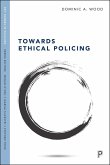The published scientific literature and public sentiments are evident in their reporting; the ethics training of police managers is not producing the desired results. Despite using a curriculum shown to produce ethical improvements, research reveals that in this specific application of policing, morality (the adherence to the ascribed ethical principles) is decreased after training. A rational means of addressing this gap in the research is found in the previously undocumented observations of the key practitioners, the educators of ethical practices for police managers. This small and difficult to access group of subject matter experts has unique experiences within the police training academies and schools of the United States. A specially designed research methodology that utilizes a tightly structured e-Delphi approach of surveying 10 practitioners directly targets the unknowns in the current knowledge base and theoretical understanding. The sample is a geographically dispersed representation of the studied population absent concern for age, education, sex, ethnicity, income level, or the social constructs of race, gender, and marital status. The thematic analysis of the participant-generated data refined from a series of surveys presented an overarching conflict between individual and communal based ethics to explain the research question. Correlating issues of police culture, insufficient education, and ambiguous organizational direction emerged as additional causes or symptoms associated with the ethical behavior of police employees. The inconsistency of police ethics follows from the inconsistency of police philosophy. For the realities of police management, including police management educators, neo-Kantian constructivism proved to be a practical model for approaching current concerns and future research.
Dieser Download kann aus rechtlichen Gründen nur mit Rechnungsadresse in A, B, CY, CZ, D, DK, EW, E, FIN, F, GR, H, IRL, I, LT, L, LR, M, NL, PL, P, R, S, SLO, SK ausgeliefert werden.









